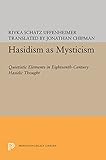Hasidism as Mysticism : Quietistic Elements in Eighteenth-Century Hasidic Thought / Rivka Schatz Uffenheimer.
Material type: TextSeries: Princeton Legacy Library ; 1748Publisher: Princeton, NJ : Princeton University Press, [2015]Copyright date: ©1993Description: 1 online resource (400 p.)Content type:
TextSeries: Princeton Legacy Library ; 1748Publisher: Princeton, NJ : Princeton University Press, [2015]Copyright date: ©1993Description: 1 online resource (400 p.)Content type: - 9780691608068
- 9781400872800
- 296.8/332
- BM198 .S297 1993
- online - DeGruyter
- Issued also in print.
| Item type | Current library | Call number | URL | Status | Notes | Barcode | |
|---|---|---|---|---|---|---|---|
 eBook
eBook
|
Biblioteca "Angelicum" Pont. Univ. S.Tommaso d'Aquino Nuvola online | online - DeGruyter (Browse shelf(Opens below)) | Online access | Not for loan (Accesso limitato) | Accesso per gli utenti autorizzati / Access for authorized users | (dgr)9781400872800 |
Frontmatter -- Contents -- Foreword -- Introduction -- Chapter One. The Basic Argument of Quietism -- Chapter Two. The Concept of "Annihilation" ('Ayiri) and the Extinction o f Human Will -- Chapter Three. The Standing o f Existential Problems in Hasidism -- Chapter Four. Despair, Sadness, Regret, and Their Connection with Sin -- Chapter Five. The Status of the Miz̦vot -- Chapter Six. Petitionary Prayer and Its Position in Hasidism -- Chapter Seven. Contemplative Prayer -- Chapter Eight. Divine Immanence and the Question o f Prophecy -- Chapter Nine. The World of Speech and The World o f Thought -- Chapter Ten. The Doctrine of Kavvanot and Its Place in Hasidism -- Chapter Eleven. Anarchic Manifestations in Hasidic Life -- Chapter Twelve. Habad: Anti-Spiritualism as a Quietistic Value -- Chapter Thirteen. Diary of an Agnostic: "I Know Not" as a Quietistic Value -- Chapter Fourteen. The Problem o f Torah Study in Hasidism -- Chapter Fifteen. History and National Redemption -- Afterword -- Appendix: The Baˁal Shem Tov's Commentary to Psalm 107: Myth and Ritual of the Descent to Sheˀol -- Bibliography -- Index of Names -- Index of Subjects
restricted access online access with authorization star
http://purl.org/coar/access_right/c_16ec
Offered here for the first time in English translation, Hasidism as Mysticism is a classic in its field. Using the tools of phenomenology, Rivka Schatz Uffenheimer places Hasidism squarely in the context of religious studies. Hasidism's theoretical texts have been largely ignored by historians of the movement, but Schatz Uffenheimer analyzes these materials fully, disclosing the mystical, quietistic tendencies that existed alongside Hasidism's more activist, popular elements. The author carefully reviewed this translation of her work; it includes a revised introduction with much new material, two new chapters, and an appendix containing a translation, history, and literary analysis of one of the few extant texts attributed to the Baal Shem Tov.Schatz Uffenheimer's inquiry covers the full gamut of Hasidic life and thought, embracing such topics as the emphasis on joy and the concomitant ban on sadness and regret in Hasidism, the focus on contemplative rather than petitionary prayer, the subordination of the mizvot (commandments) to the spiritualistic goal of devequt (attachment to God), and the anarchic elements of Hasidism's approach to life within society. Also discussed are the problematic role of Torah study resulting from this spiritualistic emphasis, the movement's neutralization or internalization of the traditional concept of a historical messiah, and the transformation within Hasidism of traditional concepts borrowed from Kabbalah. The author's illuminating hints as to the affinity between Hasidism and Christian Quietism should be of particular interest to scholars in the field.Rivka Schatz Uffenheimer (1927-1992) was the Edmonton Community Professor of Jewish Mysticism at the Hebrew University of Jerusalem. One of the outstanding students of Gershom Scholem, she forged her own path in the world of scholarship. Her research encompassed a wide range of areas: Zohar and Lurianic Kabbalah, Sabbatianism, Hasidism, and the typology of Jewish messianism. In addition, she was deeply involved in the ongoing discussion concerning the major spiritual and existential issues confronting contemporary Judaism and the State of Israel.Originally published in 1993.The Princeton Legacy Library uses the latest print-on-demand technology to again make available previously out-of-print books from the distinguished backlist of Princeton University Press. These editions preserve the original texts of these important books while presenting them in durable paperback and hardcover editions. The goal of the Princeton Legacy Library is to vastly increase access to the rich scholarly heritage found in the thousands of books published by Princeton University Press since its founding in 1905.
Issued also in print.
Mode of access: Internet via World Wide Web.
In English.
Description based on online resource; title from PDF title page (publisher's Web site, viewed 30. Aug 2021)


